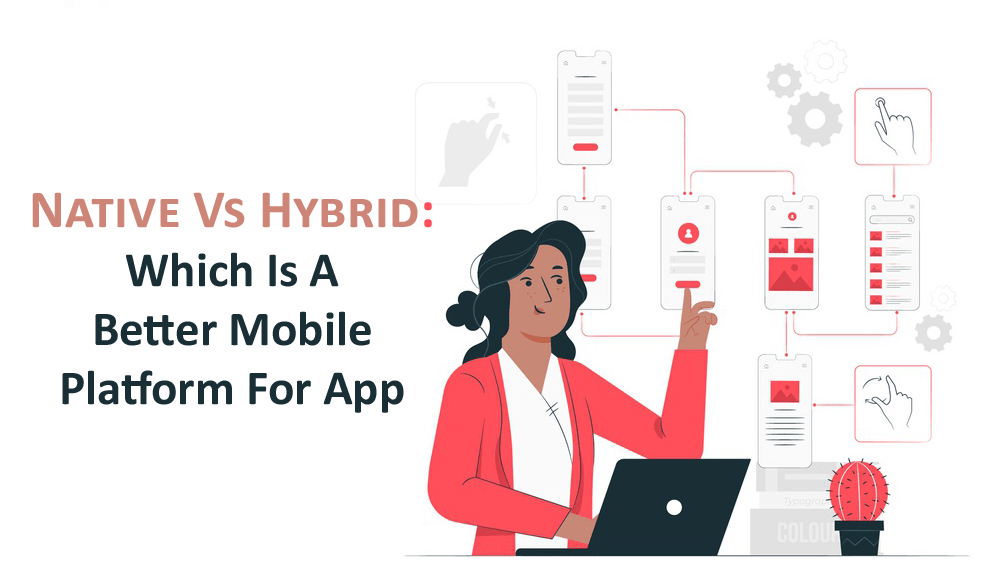
Having a strong mobile presence is no longer an option as the smartphone market is speculated to reach worldwide shipment volume up to 1.654 billion in 2022. The number of smartphone users is also expected to pass the 3 billion mark by the same year, making organizations to see hybrid mobile app development as a critical prerequisite for business growth.
But to successfully capture the attention – and wallets – of smartphone users, several choices have to be carefully made. The first – and most important choice – is the choice between native app development and hybrid app development. Each of these two approaches to mobile application development has its own benefits and shortcomings.
Therefore, let’s take a more in-depth look to determine which approach will be more suitable for your business or brand.
How to Decide on the Mobile App Development Protocol to Follow
According to Statista, users of smartphones and tablets downloaded a total of 178.1 billion apps globally from both the App Store and Google Play store in 2017. This figure is expected – and is already inching closer – to surge to a whopping 258.2 billion in 2022.
As an entrepreneur or business owner, you know what that means: you need to establish great connections with users of mobile devices by utilizing one of the two major types of mobile app development protocols: Hybrid or Native.
Picking the best solution for your mobile application depends significantly on several factors such as your budget, the timeline as well as the versatility of your team and their experience with the technology, and your target audience.
The Difference between Hybrid vs. Native Apps
Before delving deeper into which mobile app development protocol you should opt for as a startup or entrepreneur, let’s discuss the difference between native apps and hybrid apps.
Native apps:
Native apps are usually developed for specific platforms like Android or iOS. Most native apps are built using programming languages that are officially supported by the platform of choice. For iOS, Swift and Objective-C are the languages used for building apps while for Android, Kotlin, and Java are used extensively.
The developer of native apps needs to write separate codes using different programming languages for each operating system. This is essential in order to make the mobile app compatible with iOS and Android.

Hybrid apps:
Hybrid apps are usually created using web technologies such as CSS, JavaScript, and HTML combined. In a technical sense, hybrid apps are websites that are set into native apps not only to look but also to function like them.
However, a hybrid application is known to leverage cross-platform capabilities and make use of one universal code base for multiple platforms. This implies that the developer doesn’t have to code in different languages for individual platforms.
The hybrid application can then be deployed on any platform, including Android, iOS, and Windows, thus having a cutting-edge cross-platform application that appeals to your diversified end-users.
Both hybrid and native apps can be legally distributed via the official marketplaces like Google Play and App Store.
So, in other words, native apps are created specifically for either of the two major platforms mentioned above, while hybrid apps are designed to function across multiple options. They are known to perform remarkably well even though they are generally websites at the core.
Benefits of Hybrid Apps
The following are the numerous advantages of the hybrid application:
Ability to Work across Multiple Platforms
The cross-platform capabilities of hybrid app development may be the critical factor for many stakeholders as they decide whether or not to switch from native to the hybrid application. Hybrid apps can run seamlessly on both iOS and Android, having a single codebase.
This implies that you do not have to spend a lot of money and time developing an app for each platform which is the case with native applications. Developers create one codebase that functions across iOS and Android.
Stakeholders can now target as much audience as possible without going overboard, and all made possible with one solution. Hybrid application development option is the best for increasing brand awareness

Easier to Update and Change
When it comes to making updates and changes, native apps differ from hybrid apps as well.
Once again, since the hybrid application is built using a single codebase, it becomes easier to make any changes such as placement of elements, etc. and it is applied across all platforms simultaneously. For native apps, the developers have to make the changes separately on the two platforms.
It is also worth mentioning that updates that contain enhancements and bug fixes are implemented in a much better way in the hybrid app development process. Users do not have to manually download the latest version of your mobile app via marketplaces in order to get rid of an annoying bug.
If a bug attempts to disrupt user experience as a web page loads from a server, hybrid application developers can quickly fix it, and the next time a user launches the app, the refreshed version uploads.
Faster to Develop
Developing hybrid apps is less time-consuming compared to building native applications. And this is because developers have no business with creating new codes for each platform.
Moreover, the developing and testing processes are somewhat easier, and your Quality Assurance engineer will also need less time to ensure the final product is high quality and free of bugs.
Cheaper to Develop
As a result of the single codebase, it is cheaper to develop hybrid apps when compared to native apps. To build one native app for one platform will take the same amount of time required to write a single codebase for a hybrid app.
Drawbacks of Hybrid Apps
As with anything in life, if there is an advantage, there will be a disadvantage. Here are the few drawbacks that hybrid application development has:
- Limited capabilities due to the nature of the hybrid apps' architecture as they rely heavily on plugins to gain access to the built-in features.
- The Internet connection can also cause a bit of disruption as hybrid apps are websites at the core. You may encounter some difficulties whenever you implement offline access to a small part of their functionality. It also takes a bit more time for hybrid elements to load up all their elements, meaning they work a bit slower than native apps. This, however, depends on the strength of your internet connection.
- Poor User Experience: User experience is not the strong side of hybrid apps, and this is because Android and iOS have to meet somewhere in the middle.

The Need for Native App Developers
It may seem somewhat paradoxical, but the truth is that you need native app developers to build a quality hybrid app. And that is because following the hybrid mobile app development approach cannot solve a few functional problems which are fundamental for native app development.
So, you should consider getting a native app developer or two as part of your team of developers to create a high-quality and responsive product.
Hybrid App Frameworks
These days, many developers are shifting to hybrid mobile app development as it makes life easier for them. The developers can write only once and be able to build several mobile apps that run on the main platforms without strenuous additional effort.
The hybrid mobile app will run on iOS, and Android platforms, and the code can even be reprocessed for progressive web applications as well as desktop applications.
Developers can choose to work with any hybrid app framework they desire to create a fully functional mobile application. Here are some of the most useful hybrid app framework that developers use to build impressive and operational mobile apps:
Ionic
The Ionic Framework is, by far the most popular cross-platform app framework today. It was released several years ago to build an Angular-based system to extinguish jQuery mobile frameworks as well as to define an innovative approach to mobile hybrid applications.
Ionic is a 100 percent free and open-source SDK for hybrid mobile app development and provides services and tools for developing hybrid mobile apps using web technologies like HTML5, CSS, etc.
Mobile apps can be built using these web technologies and then distributed via native app stores so that they can be downloaded and installed on devices. This is only possible by leveraging Cordova.
Developers find it incredibly easy to build Progressive Web Pages (PWAs) with Ionic, thanks to its rich library with front-end building as well as premier user interface components which allows developers to create excellent PWAs.
p style="text-align: left;">The fast and popular cross-platform framework also enables developers to create top-notch graphical representations and designs in the mobile hybrid application. User interface design aspects such as image placement and design, innovative themes, typography, etc. are stuff that the remarkable Ionic framework can help developers to achieve.Ionic has over 38,000 Git stars as well as lots of contributors that provide nearly every kind of plugin to include and perform native features from haptic feedback to in-app purchases and even more. This hybrid app framework has helped over 5 million apps to jumpstart.
Examples of mobile apps built using the Ionic framework include:
- ChefSteps
- Sworkit
- Diesel
- McDonald’s Türkiye, etc.
React Native
This hybrid app framework was developed as a web-interface development platform in 2013 but was released for developing hybrid mobile apps in 2015. This hybrid app framework was officially created by Facebook and has earned an incredible reputation over the years.
Many expert developers even argue that React Native is a much better alternative to Ionic, thanks to its almost native-like experience among other mobile applications, and also offers more stability. Ionic framework users claim that it leads to much better UI and performances among apps than those built with React Native.
Nevertheless, React Native has the potential to become the best – and most professional – hybrid app framework in the future.
React Native is extensively utilized when building Android and iOS apps, thanks to the innovative use of a single JS codebase by developers. Most developers who are eloquent in Swift and Java also love to work using the React Native framework. The hybrid app comes with Native components and modules which assist in boosting the performance of an app.
Instagram, Facebook, Gyroscope, 2048 Discovery VR, etc. are using React Native to build high-performance apps.
Examples of apps developed with the React Native framework include:

- Bloomberg
- Airbnb
- 2048
- Tesla
- Skype
- UberEATS
- Wix, etc.
Flutter
This hybrid app framework which is powered by tech giants, Google, has enjoyed a lot of hype over the last couple of years. Flutter has earned the absolute respect of developers around the world.
The hybrid app framework uses Dart, a powerful language created by the search engine giant and the C++ rendering engine. Flutter also uses a 2D rendering engine called Skia to make visuals. Skia is quick and helps to create superb widgets and foundation libraries.
Flutter enables app developers to develop mobile applications with high-productive value since it has one codebase for iOS and Android. The hybrid app framework gives room for users to create brilliant UIs with creatively flexible designs.
It also allows compelling interactions that result in the creation of magnificent minimum viable products (MVPs) or prototypes. And that is why even big brands are turning to the Flutter framework to develop their applications.
Any time Google drops a new, innovative product, it becomes a hot topic of discussion in various tech forums. Big brands like Birch Finance, Alibaba, Hamilton Musical, etc. have adopted the Flutter hybrid app framework to create highly engaging and compelling apps.
And since it also grants developers – especially newbies – the opportunity to learn the Magnus opus of C++ and Google’s rendering engine – i.e. Dart – it has created a lot of hype in recent years along with several jobs as well.
Google’s new powerful mobile operating system, Fuchsia, will have its application developed via Flutter SDK.
Examples of apps developed using the Flutter framework includes:
- Alibaba
- Hookle
- Google Ads
- Watermania
- Reflectly
- Birch Finance
- Coach Yourself, etc.
Other Popular Hybrid App Frameworks
The following are other hybrid app framework apps that are immensely popular as well:
- PhoneGap
- Nativescript
- Framework 7
- Quasar
- Index XDX
- Kendo UI
- jQuery
- Mobile Angular
- Xamarin, etc.
Now that you know all about hybrid apps and native apps, your decision about which one to go for will depend on your needs, your budget, and your target audience.
.png)

 -->
-->